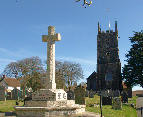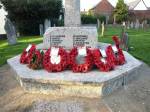Eli Parker was born in 1893, the 3rd son and 7th child of John, an agricultural worker, and Emma Parker, living at Lute House, Winkleigh. The Parker family at that time was probably the largest in the village: no less than 17 children were born to John and Emma. The Parker family tree is on this site, as is a photograph of the whole family taken about 1912. Eli greatly resembles his father, more so than the other brothers, and like his father he wore a small beard. No family in Winkleigh contributed more to the war effort than the Parkers of Lute House. Five sons served in the army, 4 returning safely, while Sidney (whose name is preserved on the Memorial Cross and whose story is written on that site) was killed at Passchendaele on 26th October 1917 leaving a young wife and baby daughter.
Unlike the army records of his four brothers whose documents were destroyed with so many others in the London blitz, those relating to Eli survived, to enable us to trace his army career. Eli can be said to have been lucky in that he served his entire war in India. The preserved Documents are numbered to correspond to the text, and can be clicked individually or in their entirety. They were, of course, much damaged in the fire and some are missing, but what we have enables us to give an accurate account of Eli’s war. His medal card gives us little else and he was awarded only the Victory Medal - he probably deserved more.
Two of the brothers, Henry and Sam, were already serving with the 6th Devons Territorials, and were thus immediately embodied on the outbreak of war, finding themselves before the year had ended stationed in India - part of the 46th Wessex Division which went there intact, less only the Brigades staff, the Field Artillery Ammunition Columns, the Royal Engineers and the Royal Army Medical Corps, all of which were made up from units in India itself. Eli, who obviously preferred to work with horses rather than join the infantry, opted for the Royal Field Artillery in the same Division.
Eli enlisted at Tavistock as a Territorial on 8th September 1914. (Documents 1, 1a, 1b and 2). Numbered 1348, he was placed in the 3rd Devon Battery of the 4th Wessex Brigade (TA) which became his home for the next few weeks. He was trained as a driver, and was thus one of a team of 6 horses and 4 drivers that pulled each of the four 15” field guns that comprised each battery. A Brigade consisted of a Headquarters and 4 Batteries, and each Brigade included 70 drivers. Eli would, of course, have been trained as well to load and fire the guns if necessary, though once the guns were unhorsed it was the job of the drivers to lead the horses to the rear so that they would not be frightened or get in the way of the firing. 218 Brigade was equipped with the old pre-war 15” guns that were by 1914 still useful, but had been outmoded by the new 18” field-guns that were the standard weapon of the war, but such were the shortages on the Western Front the Territorials in India were still making use of the older model.
The 4th Wessex Brigade was then renumbered as the 218th Brigade RFA and embarked for India with the 46th Division in the second week of October 1914. Documents 3 and 3a show that Eli was posted for a day to Larkhill (there were three training Brigades here, 541, 878 and 1170) on 8th October, leaving on 9th October, arriving in India 10 days later on 19th. The 3rd Devon Brigade (218 Brigade) was stationed at Barrackpore, (also called Chanak) which is in the State of West Bengal, northeast India, and part of the Calcutta urban conglomeration, 15 miles north of the city centre. It was an old barracks, the oldest British depot in India, dating from 1772, and gave its name to the district. India was in a state of constant unrest, the presence of the British Army vital, a role largely taken over by the Territorials in order to send the regular battalions to France. Document 3a gives the full dates of Eli’s service: 8th Sept 1914 to 8th October 1914 at home in the UK, 9th October to 18th October in transit, 19th October 1914 to 12th November 1818 in India, 13th October 1919 sailed for UK. His next of kin he gives as his Mother.
Life at Barrackpore in the heat of summer must have been an ordeal, and at times tempers must have flared. Documents 4 and 4A show that Eli was in a minor spot of bother on two occasions: on 15th September 1915 he was charged with refusing to obey an order and insolence to an NCO, and received 2 days confined to barracks (which would involve constant turn-outs, inspections and fatigues). Again on 9th September 1915 he refused to obey an order, and received a further 1 day C.B.: clearly he and one of his troop NCOs had fallen out with each other. Eli’s crime sheet is then clear until his demobilisation.
In an old, hot and probably somewhat insanitary barracks, where hygiene was difficult, , and disease could easily flourish, Eli fell sick, ( Document 5). On 9th April 1915 he was admitted to the Barrackpore hospital for 16 days with an infection of the glans - a long treatment since no antibiotics were available in those days. Eli fell sick for the second time on 6th July 1916 at the height of the Indian summer, this time with Influenza, and was treated for 7 days in hospital at Lucknow with a special diet and calomel medicine. On 29th October 1916 Eli was in hospital again, treated at Allahabad for dysentery, once again caused by poor hygiene in the barracks. This was much more serious and necessitated a stay of 53 days until 20th December 1916, allowing time for recovery from his weakness. Treatment was simply recorded as ‘enteric’. Barrackpore continued to be a most unhealthy place to live. On 25th September Eli fell ill again, this time with a touch of Malaria, and was sent to the military hospital at Ambala. (Document 5A) He was lucky to be in hospital for only 8 days, treated with quinine (Document 5B): the Ambala Cantonment military cemetery contains a number of RFA men who died in the hospital about the same time in 1918.
Renumbering of all Territorial Forces became a necessity at the end of 1916 because the old regular army was now supplemented with reinforcements from the Territorials and New Army men and on 1st March 1917 the new numbers came into effect. Eli was renumbered 865691, both the old and new numbers recorded on his medal card.
Eli’s original 3 year period of service in the Territorials came to an end in September 1917, so Eli was transferred to the regular army, still serving in the same Artillery Brigade and Battery. Document 6 and Document 4A record a clean conduct sheet for his new number 865691.
With the end of the war and a return to the UK in sight, Eli was asked to sign a statement that he did not claim for any disability (presumably bearing in mind his various hospital visits). Document 6A prevented any such claim being made at a later date. Document 6B the ‘inside sheet’ relates to an army enquiry from somewhere higher up the chain requesting confirmation of his whereabouts. Pre-demobilisation Document 7 once again confirms his clean conduct sheet.
The changeover of the war-time Indian garrisons to the regular army units took much time. The 218th Brigade moved to Ambala Cantonment on 15th December 1918 until 22nd December. The document is so faded that we do not know the next destination, but then it was on to Jubbulpore on the 15th June 1919 for a few days Journey until the 24th June (Document 3). There is no further evidence of the date of his return to the UK, but he was demobilised at Fovant on 15th November 1919. Eli’s Protection Certificate (Document 8) was given as proof that he was no deserter and to show to a future employer as proof of his war service. It could also be used if necessary to claim unemployment benefit. It records that he was medically A1 on his discharge. Once home, he remembered being told at Fovant that having served for over five years overseas he was entitled to an extra 28 days paid leave, and very rightly wrote to Woolwich to claim it (document 9).
Eli had indeed served in the army for just over 5 years: India was presumably far from his mind when he enlisted, and though he played no part in the fighting he must have regarded himself as very lucky. His brother Sidney had been killed in France, Henry had survived appalling conditions in Mesopotamia, possibly Sam as well, but no records exist either for him or Frederick who like Eli joined the Royal Field Artillery. Winkleigh can certainly be very proud of the Parker brothers and the great contribution they all made to the ultimate victory.
16 July 2011


